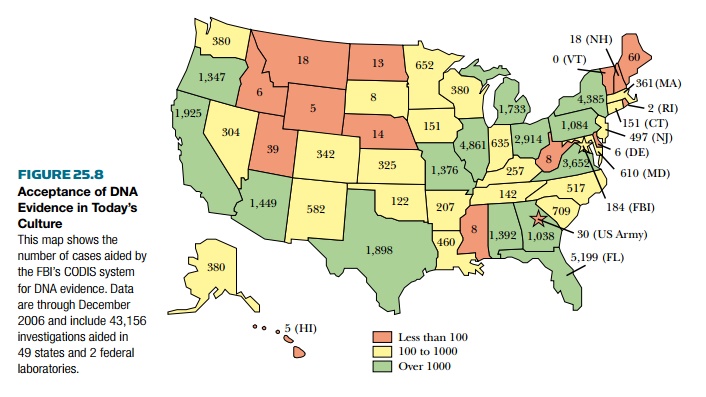Chapter: Biotechnology Applying the Genetic Revolution: Bioethics in Biotechnology
Knowledge, Identity, and Ideology
KNOWLEDGE, IDENTITY, AND IDEOLOGY
Privacy and Personal Genetic Information
It may become possible to predict future health problems by analyzing an individual’s DNA. At present this is true for a few inherited defects, mostly with major and easily observed effects. Such information might be of interest not only to the individual (see later discussion) but also to the health care system, insurance companies, employers, the military, and so on. This brings up the question of invasion of privacy.
Does the health insurance company have a right to know about your potential future health problems? Life insurance providers currently screen for age, weight, and cholesterol levels and charge higher premiums for those at risk. How will insurance companies react if they can screen for any health issue using genetic screening? Obviously, the insurance companies will have to provide most people with insurance to stay in business, but how much will rates vary depending on genomic data?
Other privacy issues include such possibilities as a national health care database. (Remember, databases for convicted criminals, especially sex offenders, are now current in many countries.) This might be used to provide prospective marital partners with information about possible inherited defects that might arise from a particular combination of parents. Other suggestions include a DNA-based identity card that would provide not only unique identity but also health care data useful in an emergency (such as allergies and blood group data) (Fig. 25.7). How will these affect the government’s role in our lives?

Foreknowledge or Deliberate Ignorance
Is ignorance bliss, or is forewarned forearmed? Genetic screening can reveal the presence of genetic
defects in adults, children, or unborn fetuses.Unfortunately, most of these defects cannot becured. Suppose that a family has a history of some genetic defect—should the children be examined and informed of the results? For example, suppose that a child has a 50:50 chance of inheriting some severely crippling defect whose symptoms appear only later in life. If the child were free of the defect, they would most likely be greatly relieved to know.
But suppose they carry the genetic defect—would they want to live with the knowledge that later in life they would become an invalid? Or would they rather not know? (Note that you cannot carry out the analysis and then withhold the information from the unlucky ones—patients who were not informed would realize that they had the defect.) Examples of this situation are relatively rare, and Huntington’s disease is perhaps the best known.
One can argue that it is best to know for several reasons:
You can take measures to avoid passing the defect on by refraining from having children. Future advances may produce a cure that you can take advantage of, providing you are informed.
You can plan your life to minimize the distress. If you didn’t know one way or the other, you would worry anyway.
Forensics and Crime
Obviously any technology that is used to combat crime can be abused. As discussed, Forensic Molecular Biology, the use of DNA for identification in both criminal investigations and civil cases (mostly paternity suits) is now widely accepted ( Fig. 25.8 ). Early technical problems have been ironed out, and the probabilities are now so overwhelming that, when properly done, DNA analysis can give a reliable and essentially unique identification. In fact, one major result of using DNA evidence has been the release of significant numbers of suspects who were wrongly convicted based on less reliable means of identification. The remaining ethical issues concern such matters as setting up national or international databases of criminal DNA records. Who will be included? Who will have access? At the moment, DNA sequences used in identification are located in regions of noncoding DNA. However, it may eventually be possible to deduce a person’s physical appearance and mental characteristics from DNA. If this is feasible, will DNA left at a crime scene be further analyzed to provide this information about possible suspects?

Conflict of Science with Traditional Religion
Religious and political establishments have been in conflict with Western science throughout history. In particular, modern advances in biology frequently conflict with traditional morality. Although genetic engineering has drawn considerable attention in recent years, few of the moral issues it raises are either truly new or unique. Germ warfare is one example. Using genetically modified viruses for germ warfare seems horribly immoral to some. Yet, is it any more (or less) immoral for a biologist to design a lethal virus than for a physicist to design a rocket with a nuclear warhead? And what of the caveman who designed a better axe to kill his competitors for food and shelter?
Although topics such as bioterrorism, evolution versus creationism, abortion, and human cloning are most familiar to modern readers, it is important to view the struggle between biology and the religious establishment historically. Long before Charles Darwin wrote TheOrigin of Species , religion and biology were locked in a power struggle. This was the clash between traditional religious belief and secular medicine. Both traditional Christianity and other religions have regarded life and health as given by God. Consequently, the established religion of many societies has claimed control over birth, reproduction, healing, and death.
This has often resulted in opposition to secular intervention in health care. For example, when vaccination first emerged, its use was widely condemned by the Christian church, especially the papacy, on the grounds that it interfered with God’s will. Epidemics of infectious diseases such as plague or smallpox were seen as God’s judgment on sinful man. If God intended you to live, then you would survive the epidemic, and if God wanted you to die, then being vaccinated to avoid this was tantamount to blasphemy.
From this perspective, issues such as abortion or human cloning may simply be regarded as modern episodes in a long-running power struggle between religious and secular control of human life. For that matter, modern biology conflicts just as much with almost all new religious cults and New Age ideology. Molecular biology affects these areas mostly in adding more detail to the picture of evolution. The basic ideological disagreements remain much as before and are beyond the scope of this book.
Clash with Egalitarian Ideologies
Just as modern biology clashes with religious ideas, it also conflicts with most secular ideologies. Whole families of secular ideologies are based on the notion of equality. But humans are not equal; they differ greatly in their capabilities, and many of these are partly or largely inherited. Both Soviet communism and American liberalism try to explain the problem of differences in human ability, especially between different demographic groups, by blaming environmental influences. Similar claims are made for the differences in male and female behavior. Just as the Christian establishment tried to censor embarrassing areas of science, so too leftist ideologies have attempted to suppress investigation and free discussion in areas such as the inheritance of IQ or the effect of hormones in determining “gender roles.” For a considerable while, the Soviet Union allowed access to “capitalist genetics” only for trusted party members, and this area was forbidden to the general population. Today genes involved in behavior and brain function are beginning to be identified, and molecular details of their mechanisms and roles are starting to accumulate. These findings increasingly undermine the whole concept of human equality.
One fascinating example is the case of homosexuality. Some 20 years ago the suggestion that homosexuality was due to a genetic defect was highly “politically incorrect” and would have drawn accusations of “homophobia” from American liberals. Today, some gay organizations themselves maintain that homosexuality has a genetic basis. So far there is no convincing evidence one way or another, although it is hard to believe that genetics is not involved.
Ownership of Genetic Information
The ownership of knowledge is an age-old question. It is generally accepted in the Western industrial nations that if you invent something, you are entitled to patent it and profit from it. But how far do such rights extend? If you invent a camera, it is clear that you own the rights to the camera. But what if you use the camera to take a photo of the moon? Do you then own the moon, or just the photo? This sounds silly as stated. But what if you invent
a DNA sequencing apparatus and proceed to sequence a gene (perhaps from some other human)—do you own the sequence information? Should you be able to patent preexisting information that new technology has revealed, or should patents be restricted to novel methods, machines, or techniques?
Genetically modified bacteria and other transgenic organisms have been patented in considerable numbers. They are presumably regarded as new inventions. The question of ownership of DNA sequences is still disputed, and different countries have different attitudes. In practice it is selling drugs and diagnostic kits that brings in the money. So far, at least, no DNA sequence has allowed the direct prediction of a drug or treatment that will cure a disease. Consequently, the actual financial value of knowing a DNA sequence is debatable. Should scientists working at universities with public funding be allowed to patent their discoveries and profit personally? In practice, most universities have schemes wherebyprofits are split, say, 50:50 between investigator and institution. Another viewpoint is that all knowledge from research funded by the taxpayer should be public property, or even that all information should be shared freely by all humankind. Although the last attitude may sound excessively idealistic, keeping information secure is a lot more difficult in practice than guarding physical possessions. The copying of videotapes and music CDs or the downloading of MP3s over the Internet are cases in point.
Related Topics